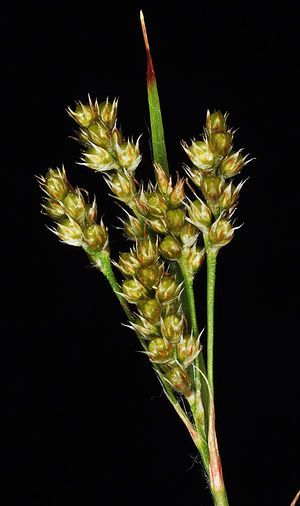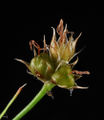Difference between revisions of "Luzula comosa var. laxa"
(→Taxonomy) |
|||
| Line 1: | Line 1: | ||
| − | * | + | * Scientific Name: ''Luzula comosa'' var. ''laxa'' |
* Family: Juncaceae | * Family: Juncaceae | ||
* Common Names: Pacific woodrush | * Common Names: Pacific woodrush | ||
* Synonyms/Misapplications: ''Luzula intermedia, Luzula multiflora'' subsp. ''comosa'' | * Synonyms/Misapplications: ''Luzula intermedia, Luzula multiflora'' subsp. ''comosa'' | ||
* Codon: LUZCOM | * Codon: LUZCOM | ||
| − | + | ---- | |
| − | == Taxonomy == | + | [[File:LUZCOM1.jpg |thumb|Photo by Robert L. Carr, also featured on Main Page]] |
| + | === Taxonomy === | ||
{{Taxobox | {{Taxobox | ||
| − | | image = | + | | image = |
| image_caption = Photo by Robert L. Carr. Also featured on Main Page. | | image_caption = Photo by Robert L. Carr. Also featured on Main Page. | ||
| name = ''Luzula comosa'' var. ''laxa'' | | name = ''Luzula comosa'' var. ''laxa'' | ||
| Line 28: | Line 29: | ||
<ref>Integrated Taxonomic Information System. Retrieved from https://www.itis.gov/servlet/SingleRpt/SingleRpt?search_topic=TSN&search_value=39339#null</ref> | <ref>Integrated Taxonomic Information System. Retrieved from https://www.itis.gov/servlet/SingleRpt/SingleRpt?search_topic=TSN&search_value=39339#null</ref> | ||
| − | ==Description== | + | ===Description=== |
Native tufted perennial, reaching 1-4 dm in height. | Native tufted perennial, reaching 1-4 dm in height. | ||
| Line 41: | Line 42: | ||
Seattle: University of Washington Press.</ref> | Seattle: University of Washington Press.</ref> | ||
| − | ==Bloom Period== | + | ===Bloom Period=== |
April to July<ref name=":0" /> | April to July<ref name=":0" /> | ||
| − | ==Distribution== | + | ===Distribution=== |
BC to California, along both sides of Cascades, east to Alberta, Montana, Utah, and New Mexico.<ref name=":1" /> | BC to California, along both sides of Cascades, east to Alberta, Montana, Utah, and New Mexico.<ref name=":1" /> | ||
| − | ==Habitat== | + | ===Habitat=== |
Openings, rocky slopes, forest, and shores, coastal to montane.<ref name=":1" /> | Openings, rocky slopes, forest, and shores, coastal to montane.<ref name=":1" /> | ||
| − | == Seed == | + | === Seed === |
Seed sample from:''' 2008''' | Seed sample from:''' 2008''' | ||
| Line 69: | Line 70: | ||
'''Longitudinal Cross Section:''' elliptical [[File:Luzula long.png]] | '''Longitudinal Cross Section:''' elliptical [[File:Luzula long.png]] | ||
| − | == Photo Gallery == | + | === Photo Gallery === |
<gallery> | <gallery> | ||
File:LUZCOM2.jpg| Photo by Robert L. Carr | File:LUZCOM2.jpg| Photo by Robert L. Carr | ||
</gallery> | </gallery> | ||
| − | ==References== | + | ===References=== |
<references /> | <references /> | ||
Latest revision as of 21:43, 20 March 2021
- Scientific Name: Luzula comosa var. laxa
- Family: Juncaceae
- Common Names: Pacific woodrush
- Synonyms/Misapplications: Luzula intermedia, Luzula multiflora subsp. comosa
- Codon: LUZCOM
Contents
Taxonomy
| Luzula comosa var. laxa | |
|---|---|
| Scientific classification | |
| Kingdom: | Plantae |
| Subkingdom: | Viridiplantae |
| Phylum: | Tracheophyta |
| Subphylum: | Spermatophytina |
| Class: | Magnoliopsida |
| Subclass: | Lilianae |
| Order: | Poales |
| Family: | Juncaceae |
| Genus: | Luzula DC. |
| Species: | Luzula comosa E. Mey |
| Subspecies: | Luzula comosa var. laxa Buchenau (not accepted) |
| Synonyms | |
| |
Description
Native tufted perennial, reaching 1-4 dm in height.
Leaves are grass-like, reddish to green, with long, fine hairs along leaf margin.
Inflorescence consists of 1 to 6 brownish glomerules (a condensed, headlike, cluster of flowers). The individual flowers consist of 6 membranous pallid, brownish tepals. Luzula comosa var. laxa generally has a more open, subumbellate inflorescence than Luzula comosa var. comosa, which has a tighter capitate inflorescence.
Juncaceae family members are differentiated from grasses in that they typically feature round stems, without nodes. [2][3]
Bloom Period
April to July[2]
Distribution
BC to California, along both sides of Cascades, east to Alberta, Montana, Utah, and New Mexico.[3]
Habitat
Openings, rocky slopes, forest, and shores, coastal to montane.[3]
Seed
Seed sample from: 2008
Average Measurement: 1.5 x 0.9 x 0.9
Measurement Range: L: 1.2 – 1.8, W: 0.8 – 1, D:0.8 – 1
Features
Shape: Seeds have prominent white caruncle. Seed mostly round except for a slightly pointed tapering at hilum and opposite apex.
Color: Seed coat is white over a dark reddish brown seed body.
Surface: On one side of seed there is a cloudy white line that crosses from hilum to opposite apex. Seed is lustrous and marked with many fine longitudinal lines.
Latitudinal Cross Section: elliptical 
Longitudinal Cross Section: elliptical ![]()
Photo Gallery
References
- ↑ Integrated Taxonomic Information System. Retrieved from https://www.itis.gov/servlet/SingleRpt/SingleRpt?search_topic=TSN&search_value=39339#null
- ↑ 2.0 2.1 Bowcutt, F., & Hamman, Sarah. (2016). Vascular plants of the South Sound prairies (First ed.). Olympia, Washington: The Evergreen State College Press.
- ↑ 3.0 3.1 3.2 Hitchcock, C. L., Cronquist, A., Giblin, D., & Legler, B. et al. (2018). Flora of the Pacific Northwest: an illustrated manual. Seattle: University of Washington Press.


